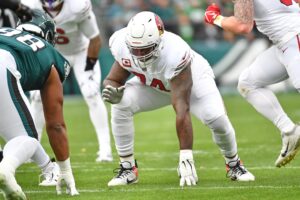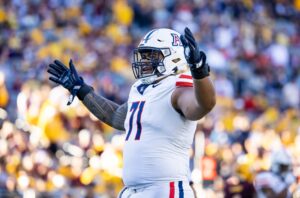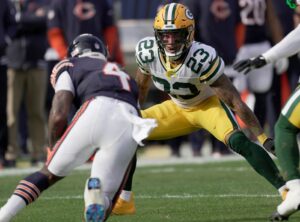The Buffalo Bills were able to fill multiple holes in the 2018 NFL Draft, including quarterback. Unlike 2017, the Bills traded up more than once in the first round, spending five picks in total. The Bills were still able to have a normal draft, as they had acquired a bevy of picks a season ago via trade. This year’s trades are as follows:
- Traded 12th, 53rd, and 56th overall picks to Tampa Bay Buccaneers for 7th and 255th overall picks
- Traded 22nd and 65th overall picks to Baltimore Ravens for 16th and 154th overall picks
The Bills were able to select two players they coveted in the first round, but it came at a cost. After the 16th overall selection, the Bills did not pick again until the end of the third round. Here’s the full list of their eight selections:
- First round, 7th overall: Josh Allen, quarterback, Wyoming
- First round, 16th overall: Tremaine Edmunds, linebacker, Virginia Tech
- Third round, 96th overall: Harrison Phillips, defensive tackle, Stanford
- Fourth round, 121st overall: Taron Johnson, cornerback, Weber State
- Fifth round, 154th overall: Siran Neal, safety, Jacksonville State
- Fifth round, 166th overall: Wyatt Teller, guard, Virginia Tech
- Sixth round, 187th overall: Ray-Ray McCloud, wide receiver, Clemson
- Seventh round, 255th overall: Austin Proehl, wide receiver, North Carolina
Buffalo Bills 2018 NFL Draft Grade: 7/10
Buffalo Bills 2018 NFL Draft Review
The Best Player: Tremaine Edmunds
Edmunds was considered by many to be one of the top defensive players in the draft, and the Bills were fortunate that he fell to 16. He’s projected to be a Pro Bowl-caliber linebacker and should make an immediate impact for the Bills. Edmunds does not turn 20 for another week and was the youngest player to be selected in this draft.
Edmunds is a physical freak, standing at 6’5″ and weighing in at 253 pounds. He ran the forty yard dash in 4.54 seconds at the combine, possessing unique speed for this size. Edmunds played outside linebacker for the Hokies, but the Bills may move him around as needed. Edmunds made 102 total tackles and 5.5 sacks in 2017.
The Bills severely needed to bolster their linebacker corps after losing centerpiece Preston Brown in free agency. Depth was also a problem, resulting in the Bills finishing 29th in rushing yards allowed last season. The Bills also lack a quality pass rush, which now can be aided by Edmunds.
Edmunds is an above average tackler and uses his exceptional athleticism to cover all aspects of the field. He has great burst and power, but he needs to develop play-diagnosis and instinct.
The Bills should be able to mold this great talent into something special. In the meantime, Edmunds figures to be a day one starter who can make an immediate impact.
The Head Scratcher: Josh Allen
The Bills had been in dire need of a quarterback since Jim Kelly‘s retirement in January 1997, making this quarterback-heavy draft a vital one.
The Bills had passed on a quarterback in the 2017 draft with both Patrick Mahomes and Deshaun Watson on the board, choosing instead to trade down 17 spots to take cornerback TreDavious White. After parting ways with three-year starter Tyrod Taylor this off-season and signing veteran back-up A.J. McCarron, the Bills looked poised to make a run at one of the draft’s top passers.
Many initial reports came out that the Bills and general manager Brandon Beane coveted Allen, and they ended up drafting their guy. Beane was prepared to trade up even higher to get Allen, according to ESPN’s Adam Schefter.
Buffalo and Denver had agreed to a trade based on who was available; but Broncos decided not to pass up Bradley Chubb, then Bills went to No. 7 instead. For Josh Allen.
— Adam Schefter (@AdamSchefter) April 27, 2018
The head-scratching part of this pick is that Allen, largely a developmental prospect, was selected while UCLA’s Josh Rosen was still on the board. Rosen checks most of the boxes in what teams should want in a franchise quarterback. He routinely made anticipatory throws, fit the ball into tight windows, and read defenses very well. Rosen also had excellent upper body mechanics and impeccable footwork to go along with a superior understanding of the offense. Where Rosen is pro-ready and polished, Allen is raw and untamed.
Allen struggled mightily to read defenses in a weaker Mountain West Conference and did not routinely make NFL-level throws. On film, Allen lacks anticipation and timing, often relying purely on arm strength to complete passes. His footwork and mechanics are not consistent, and he needs a lot of coaching. His accuracy, or lack thereof, is troubling. Allen completed only 56.2 percent of his passes at Wyoming and only threw for 1,812 yards his junior season. Due to these concerns, it may be difficult for Allen to translate into an NFL talent.
His lack of skills needed to play quarterback at the pro-level is worrisome, but Allen possesses a cannon for an arm. He also has prototypical size and athleticism for an NFL quarterback. Allen could eventually develop with patience and good coaching, but it’s unlikely that he makes an immediate impact. With the issues the Bills may face in the passing game and the amount of capital they surrendered, they needed a quarterback that could potentially step in on day one.
Allen needs a lot of work, and the Bills may not be able to afford to wait for that process.
The Surprise: Ray-Ray McCloud
This pick was surprising because the Bills waited so long to fill one of their biggest needs at wide receiver. What’s even more surprising is that even with better prospects like Notre Dame’s Equanimeous St. Brown still available, the Bills selected a punt returner in McCloud.
McCloud has the look of a gadget player and played a bit of receiver and cornerback at Clemson along with returning kicks. He does possess good catching ability but lacks size and elite speed. McCloud will make a push to be the lead returner for the Bills, but his talent level may lead to him being relegated to the practice squad.
The Bills had a talented receiving corps in 2016, boasting guys like Sammy Watkins, Robert Woods, and Marquise Goodwin, who all departed before last season. 2017 saw a wideout overhaul, with the Bills acquiring Jordan Matthews, Kelvin Benjamin, Andre Holmes, and Zay Jones. They failed to live up to expectations and their most effective receiver ended up being Deonte Thompson, who only caught 27 passes for 430 yards.
There were multiple mid-round talents that could have immediately improved the receiving corps, but the Bills chose to wait until round six. When they did, they took a returner.
The Steal: Wyatt Teller
One of the better selections the Bills made was Teller, who can make a push for a starting guard gig this season. The Bills had a hole to fill when they lost Pro Bowl guard Richie Incognito to retirement in a bizarre chain of events last month.
Teller is an aggressive lineman that excels in run-blocking. He is also effective in pass-protection, something the Bills have generally lacked. He has a muscular frame and has a chance to be an effective NFL starter. NFL.com’s Lance Zierlein gave him a projection of a third or fourth round pick, making him a steal in the fifth round. Zierlein criticized Teller’s drop in effectiveness from 2016 to 2017, citing a lack of effort and discipline.
Teller still figures to challenge the likes of Ryan Groy, Vlad Ducasse, and John Miller for a starting guard position. He has a shot to develop into a nice player, especially under Sean McDermott, who runs a tight ship in terms of discipline.
Most Likely to Turn Heads in Training Camp: Harrison Phillips
Phillips is a stout, run-stopping defensive tackle. He possesses similar traits to the Bills’ own Kyle Williams, whom they brought back on a one-year deal. Phillips has a chance to develop under the tutelage of Williams, who is considered one of the best Bills players in the past decade.
Phillips is a cerebral lineman that relies on technique and power to get the job done. While the more talented defensive tackle from Michigan, Maurice Hurst, was still on the board, Phillips evidently fits what McDermott wants on he and coordinator Leslie Frazier‘s defense. At 6’3″ and 307 pounds, Phillips possesses excellent strength, bench pressing 225 pounds 42 times at the combine.
Fans will be excited to see the supposed heir to the beloved Williams in training camp, no doubt.
The Rest
While it can be said that cornerback Johnson was selected a little early for his projection of the fifth or sixth round, he has a nice shot to compete for the nickel corner spot. The Bills needed depth at corner and lost 2017 nickel Leonard Johnson in free agency. Johnson has nice quickness, awareness, and is a quality coverage corner. He lacks the ideal size to play on the outside but can be effective in nickel and dime packages.
Neal, who converted from linebacker to safety in college, provides much-needed depth at safety. Neal is an aggressive player that is an efficient tackler and is an explosive football player. The Bills had a difficult time when both of their starting safeties, Micah Hyde and Jordan Poyer, went down with injuries at certain points in 2017. Neal will be able to be a safety valve in case they need him to step in.
The last pick the Bills made was Proehl, the son of former NFL receiver Ricky Proehl. Proehl has nice speed, quickness, and is a precise route-runner. A smaller body, Proehl will likely play as a slot receiver, something the Bills have plenty of. He will likely be a training camp body, as most late-seventh rounders are, but time will tell if he can make a push to be an effective slot in the mold of fellow late-round pick Julian Edelman.
Bottom Line
Beane’s first draft as the Bills general manager went relatively well, though he paid a premium for his quarterback. The pick itself is fine if Beane and the Bills truly believe they can turn Allen into an effective passer. Yet the Bills gave up a lot to move up ahead of teams that probably were not selecting a signal-caller, only to choose a guy that likely will not start right away. The better choice at this stage of the game due to his superior passing skills and pro-readiness would have been Rosen, who went at pick 10 to the Arizona Cardinals.
They should have addressed wide receiver much earlier than they did, as the current lineup lacks speed and separation skills. This is especially troublesome considering they drafted an untamed quarterback higher than they ever had before, and their other two quarterbacks in McCarron and Peterman have only a combined five career starts.
The Bills did address needs on the offensive line and secondary, and the Teller pick was a steal.
The selection of Edmunds at 16 makes this draft, as he is an elite talent and can dominate right away. The Bills didn’t have to give up too much to move up and draft him, and it will be well worth the pick. Edmunds has a chance to anchor the defense, and at only 19 years of age, he can develop even further.
The Bills got a little deeper, but only walked away with one potential day-one impact player, which is concerning when considering the talent level that is on the current roster.
Main photo:
Embed from Getty Images






